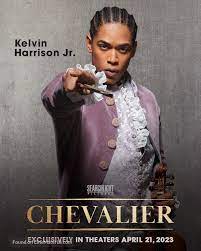
CHEVALIER
US, 2022, 108 minutes, Colour.
Kelvin Harrison Jr, Samara Weaving, Lucy Boynton, Ronke Aekoluejo, Martin Csoakas, Alex Fitzalan, Minnie Driver, Sian Clifford, Henry Lloyd-Hughes.
Directed by Stephen Williams.
Perhaps an interesting question for a music trivia evening might be “who is Joseph Bologne and when did he live?”. For more than two centuries he has not been well-known or documented. However, he and his reputation have emerged in more recent times.
The answer is that Joseph Bologne was a talented musician-composer, an expert violinist in Paris in the years prior to the French Revolution. So, why is he not so well-known? The immediate answer is that he was born in Guadalupe, his father a French plantation owner, his mother a local slave. He was black. And, while he did achieve a great deal of success, ultimately his racial background was against him.
This film opens quite dramatically, a fictitious account of Mozart playing his violin in a Paris concert, Joseph Bologne walking up the aisle, challenging Mozart to a violin duel, showing his virtuosity, the audience rising in excited applause. He was also an expert fencer, defeating an aristocratic challenge, impressing Marie Antoinette and his being dubbed Chevalier de Saint-Georges. He becomes something of a toast of Paris, spurning the advances of an ageing diva, Minnie Driver, but ambitious to be the new Director of the Paris Opera.
Kelvin Harrison Jr gives an accomplished performance as Joseph Bologne, memories of his being brought by his father to Paris when very young, admiring his skill with the violin, paying for him to be educated but his being bullied and mocked. Now he is a man of pride, even arrogance, presumptuous about his talents and where they could lead him. He composes an opera, Ernestine, and it is produced, a talented young singer, Marie Josephine (Samara Weaving), taking the lead despite her dominating Count-husband (Marton Csokas) forbidding her. And a liaison ensues. The main competitor for Director of the Opera is the composer, Christophe Gluck. Given present society before the revolution, colonial attitudes, racist superiority, it is not a surprise who wins!
This is quite a lavish production, the period being beautifully re-created, costumes, décor, lighting, atmosphere. But, there are revolutionary rumblings, Marie Antoinette out of favour (and the Chevalier turning against her because of the Opera house decision), Joseph Bologne supporting an aristocrat friend who supports the revolution, composing a concert to support the revolutionary movement, leading to a confrontation with the count, who threatens to break the violinist’s fingers.
The film gives some information as to what happened after this period – but the film also provides the opportunity for audiences to hear some of the Chevalier’s classical compositions. Audiences will enjoy this visit to 18th century Paris.
- Audience knowledge of Joseph Bologne? His life, his music, his career?
- The portrait of a musician, the incorporation in the film of some of his music, his origins, plantation owner father, Guadaloupe slave as his mother, brought to Paris, his father leaving him, to be educated? His skills with the violin? Education, bullying, standing his ground? His skills as a fencer and the demonstration, Marie Antoinette watching? His skill as a musician, the duel with Mozart with the violin? The immediate acclaim and enthusiasm from the audience?
- His skills and recognition by Brazilian society, the issue of race, the issue of colonialism? His being despised? His being feted? His title of Chevalier? The support of his close friend?
- The question of the leadership of the Paris Opera, his ambitions, talent, with Marie Antoinette, the clash with the diva and her enmity, the encounter with Marie-Josephine, her singing, her husband? The encounter with Gluck, his talent, connections, nominee for the leadership of the Opera? Each of them composing an Opera?
- Joseph, the link with Madame Diginnis, her assistance, Josephine and the rehearsals, falling in love, the sexual encounters?
- The marquis, his personality, reputation, military, marriage to Marie Josephine, domination of her, forbidding her to sing, his long absence? His return, the confrontation, treatment of his wife, relegating her? The confrontation with Joseph?
- The writing of the Opera, Ernestine? The help, his friends, the performance? Success? Gluck, his Opera, the performance? The audiences? Marie Antoinette? The committee, the meeting, the judgement, the races, the decision for Gluck? The news for Joseph, his reaction? The influence of the diva?
- Audience knowledge of Marie Antoinette, the foreigner, Queen, the week Louis XVI, her influence, society, patronage of Joseph, the change, cautious for her reputation? Joseph turning against her?
- Philippe, nobility, get on the side of revolution, his meetings, Joseph attending the meetings, agreed to do the concert in support of the revolutionaries? The return of the marquis, coming to the theatre, the confrontation with Joseph, his withdrawing?
- Joseph’s mother, absent, her arrival, her love for her son, his resentment towards her, the issue of racism, the black population of Paris and his status?
- The absence of Marie Josephine, a choice to be with her husband, her pregnancy, the encounter with Joseph, giving birth, his child, the marquee killing the child?
- The denunciation of Marie Antoinette, his removing his wing, identifying with his race, with the revolutionaries?
- The movement towards revolution, the concert, the marquis, the assailing of Joseph and the threat to break his fingers?
- Joseph, his enlistment, fighting for the revolution, his rank?
- The film and its retrospect, the rediscovery of Joseph, in the context of pre-revolutionary France, French colonialism and slavery, his skill as a musician, his musical compositions?